Intel's Core i7 870 & i5 750, Lynnfield: Harder, Better, Faster Stronger
by Anand Lal Shimpi on September 8, 2009 12:00 AM EST- Posted in
- CPUs
Intel is on the verge of transitioning to 32nm. We'll see the first parts this year. What do you do with your 45nm fabs when you start moving volume away from them? Make really cheap quad-core Nehalems of course:
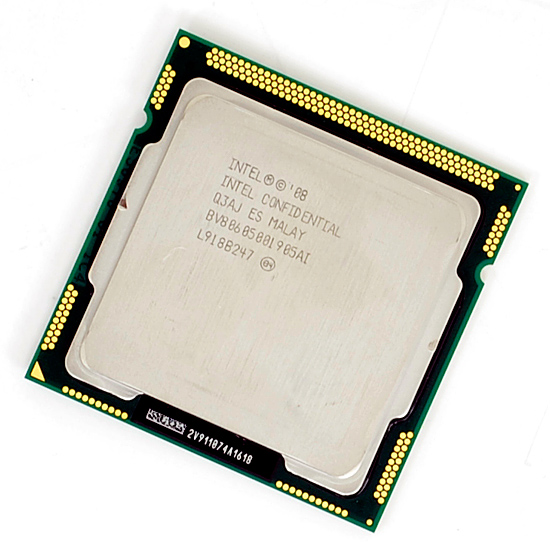
I'm talking $196. I'm talking faster than AMD's entire lineup. I'm talking about arguably the best processor of 2009. I'm talking about Lynnfield, and here's its backside:
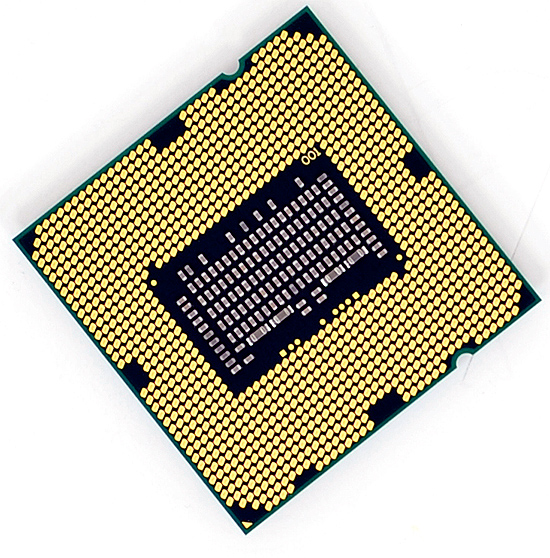
Mmm
I spent much of the past year harping on AMD selling Nehalem-sized Phenom IIs for less than Intel sold Nehalems. With Lynnfield, Intel actually made Nehalem even bigger all while driving prices down. Like I said, what do you do when you're still making boatloads of money in a recession and are about to start emptying your 45nm fabs?
I should clear things up before we progress much further. Lynnfield is the codename for mainstream 45nm quad-core Nehalem, while Bloomfield refers to the first Nehalem launched at the end of 2008:
| Processor | Manufacturing Process | Die Size | Transistor Count | Socket |
| Bloomfield | 45nm | 263 mm2 | 731M | LGA-1366 |
| Lynnfield | 45nm | 296 mm2 | 774M | LGA-1156 |
Despite being cheaper, Lynnfield is larger than Bloomfield. The larger die is due to one major addition: an on-die PCIe controller.
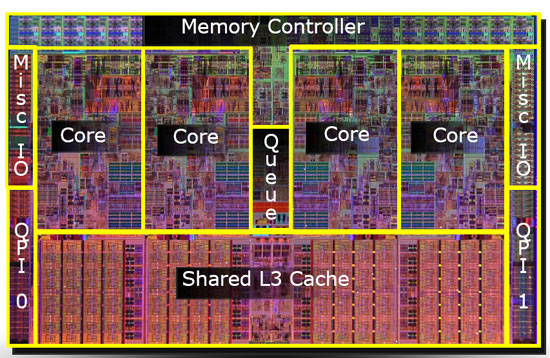
Bloomfield, The First Nehalem, circa 2008
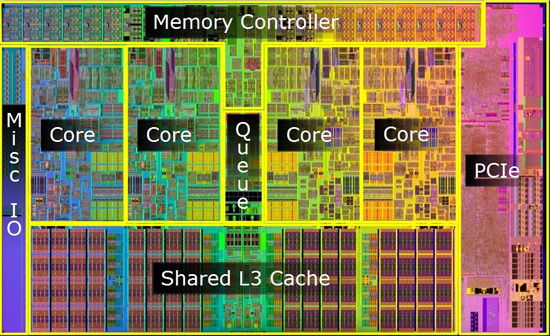
Lynnfield, Nehalem for All, circa 2009
The pink block to the right of the die is the PCIe controller, that's 16 PCIe 2.0 lanes coming right off the chip. Say hello to ultra low latency GPU communication. You'd think that Intel was about to enter the graphics market or something with a design like this.
Sacrifices were made to reduce CPU, socket and board complexity. Gone are the two QPI links that each provided 25.6GB/s of bandwidth to other CPUs or chips on the motherboard. We also lose one of the three 64-bit DDR3 memory channels, Lynnfield only has two like a normal processor (silly overachieving Bloomfield).
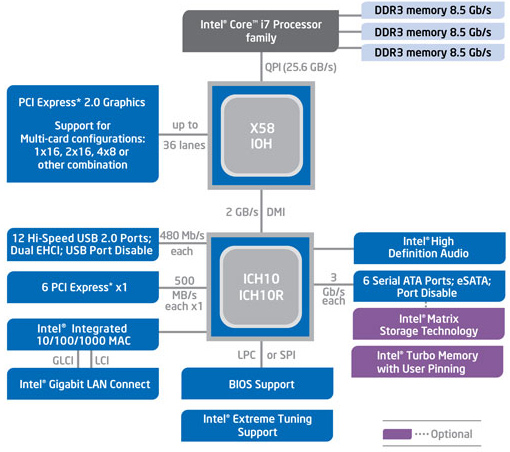
Intel's Bloomfield Platform (X58 + LGA-1366)
The sum is that Lynnfield is exclusively single-socket; there will be no LGA-1156 Skulltrail. While the dual-channel memory controller isn't really a limitation for quad-core parts, six and eight core designs may be better suited for LGA-1366.
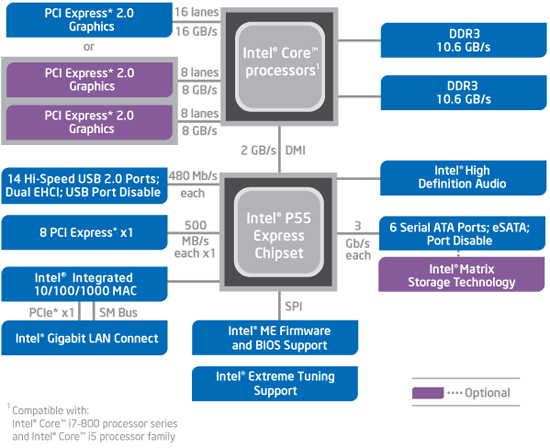
Intel's Lynnfield Platform (P55 + LGA-1156)
The loss of QPI means that Lynnfield doesn't have a super fast connection to the rest of the system, but with an on-die PCIe controller it doesn't matter: the GPU is fed right off the CPU.
The Lineup
We get three Lynnfield CPUs today: the Core i7 870, Core i7 860 and the Core i5 750. Intel's branding folks told us that the naming would make sense one we saw the rest of the "Core" parts introduced; yeah that was pretty much a lie. At least there aren't any overlapping part numbers (e.g. Core i5 860 and Core i7 860).
The i7 in this case denotes four cores + Hyper Threading, the i5 means four cores but no Hyper Threading. The rules get more complicated as you bring notebooks into the fray but let's momentarily bask in marginal simplicity.
| Processor | Clock Speed | Cores / Threads | Maximum Single Core Turbo Frequency | TDP | Price |
| Intel Core i7-975 Extreme | 3.33GHz | 4 / 8 | 3.60GHz | 130W | $999 |
| Intel Core i7 965 Extreme | 3.20GHz | 4 / 8 | 3.46GHz | 130W | $999 |
| Intel Core i7 940 | 2.93GHz | 4 / 8 | 3.20GHz | 130W | $562 |
| Intel Core i7 920 | 2.66GHz | 4 / 8 | 2.93GHz | 130W | $284 |
| Intel Core i7 870 | 2.93GHz | 4 / 8 | 3.60GHz | 95W | $562 |
| Intel Core i7 860 | 2.80GHz | 4 / 8 | 3.46GHz | 95W | $284 |
| Intel Core i5 750 | 2.66GHz | 4 / 4 | 3.20GHz | 95W | $196 |
Keeping Hyper Threading off of the Core i5 is purely done to limit performance. There aren't any yield reasons why HT couldn't be enabled.
Intel was very careful with both pricing and performance of its Lynnfield processors. I'm going to go ahead and say it right now, there's no need for any LGA-1366 processors slower than a Core i7 965:
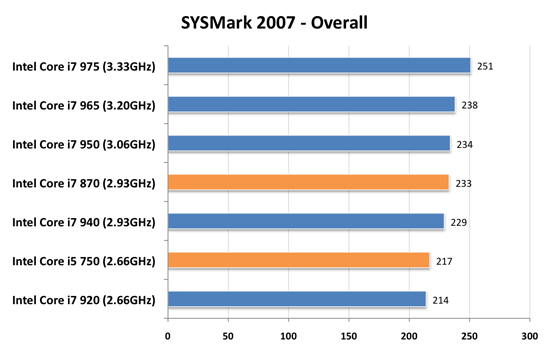
This is only one benchmark, but it's representative of what you're about to see. The Core i7 870 (LGA-1156) is as fast, if not faster, than every single LGA-1366 processor except for the ones that cost $999. Its pricing is competitive as well:
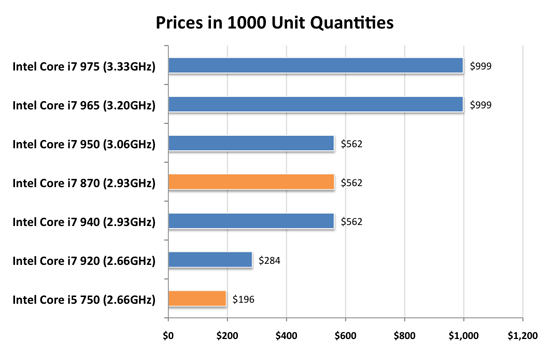
For $196 you're getting a processor that's faster than the Core i7 920. I'm not taking into account motherboard prices either, which are anywhere from $50 - $100 cheaper for LGA-1156 boards. I don't believe LGA-1366 is dead, but there's absolutely no reason to buy anything slower than a 965 if you're going that route.










343 Comments
View All Comments
JonnyDough - Thursday, September 10, 2009 - link
Were you purposely reiterating my point? :DI don't think AMD ever much cared about what Intel was doing. In business class I was taught to keep an eye on a competitor but to really focus on what you are doing. I think AMD was planning their next move, and it had little to do with what Intel was doing or planned on doing, but rather the reaction of what Intel would do when they created Athlon and the next step to being a successful innovative company. Going graphics was just a logical step, since NVidia had no real competition in this space. They saw a market that was ruled by two giants, and decided to combine technology. I'm not so sure that Intel had the idea first. Don't forget, there are leaks in this industry, and people are getting paid to snitch.
tajmahal - Tuesday, September 8, 2009 - link
This is the first time i've ever seen an article written using wholesale x 1,000 prices. Is there any reason you didn't take the trouble to post actual retail pricing?JonnyDough - Tuesday, September 8, 2009 - link
He probably wrote this article prior to today and based it off Intel's pricing scheme...I would think you'd probably gather that. NewEgg is also not the only E-tailer/Retailer out there...ViRGE - Tuesday, September 8, 2009 - link
The last time I checked, those are the only prices Intel gives out. The actual retail prices are a combination of what the retailer paid (buy more, spend less) and whatever markup they add. Intel doesn't have an MSRP.tajmahal - Tuesday, September 8, 2009 - link
i5 750 = $210i7 860 = $300
i7 870 = $580
Just in case someone wants to buy just 1 instead of 1,000. Newegg prices
Gary Key - Tuesday, September 8, 2009 - link
"i5 750 = $210i7 860 = $300
i7 870 = $580
Just in case someone wants to buy just 1 instead of 1,000. Newegg prices "
Retail prices fluctuate greatly at launch. This is what I paid for our retail processors with tax mind you. ;)
i5 750 = $205
i7 860 = $306
i7 870 = $564
cycleback - Tuesday, September 8, 2009 - link
Could you post some Linpack and finite element code benchmarks. This would approximate a larger number of HPC workloads. I would really appreciate this as it is difficult to find these sorts of benchmarks. It would also really test the difference in memory bandwidth between Bloomfield and Lynfield.tacoburrito - Tuesday, September 8, 2009 - link
From the benchmarks, the i7 920 and the i5 seems to be even; each winning about half the benchmarks. If costs for both are the same (proc and mobo), I think I'd still go with the 920. Of course I can stop being a cheap bastard and spring for the i7 860.tacoburrito - Tuesday, September 8, 2009 - link
I also meant to add that it should just be a matter of time before Intel cut the prices of the 920.TA152H - Tuesday, September 8, 2009 - link
One thing that's obvious is, after reading this, that the esteemed reviewer modified his review in order to fulfill his preconceived ideas of what he wanted to say. It's really a terrible review.Most people know this site isn't technical, but still, I always thought it was unbiased. It's biased, big time, just not for a company. It's about making a review say what they want.
For example, I doubt Anand is really as stupid as he sounds in this article. LGA1366 has so many advantages, certainly he knows this. But why the idiotic remarks about asking why it exists?
Why did this review ignore the fact that most people here overclock? Why did it ignore that most people reading these reviews won't use DDR3 1066 memory? Did this site just try to become PC Magazine without the writing talent, and go stock? I think not. It was because they only wanted to give information that was consistent with their preconceived idea.
But, let's look closer. The memory controller on the Bloomfield is actually faster than the Lynnfield when using the same memory, even when running in dual channel mode. Why wasn't it mentioned here?
Why wasn't a clock normalized comparison between the LGA1366 processors and LGA1156 processors made, or even attempted, to get an idea of what the architecture changes accounted for? Strange that this very important data is missing? I think so.
Why weren't overclock processors compared? I mean, will anyone here buy an i7 920 and not overclock it? Probably not many. Since the only real advantage is the more aggressive turbo mode, this was what the article was based on. But, in reality, for readers here, it's not important, since people are going to overclock, and the i7 920 would wipe the floor up with the Lynnfields in the configuration that would be used. Why no mention of this?
There are better sites that have answered these questions. I used to like this site, but this review is another disappointment.
Let's be real though, it looks like the processor's horrible performance in the pre-release configuration is just a bad memory. It's not a bad part by any stretch, but it's hardly made the LGA1366 useless, or even the i7 920. The technical savvy will still opt for it in a lot of instances, since they will overclock it. If you have to recommend something for a friend that won't, these things are fine.
Another really stupid remark was how AMD processors would only make sense if they drop the price. Have you forgotten AMD processors are coupled with excellent IGPs? That's been the big selling point for a while, and this hasn't really changed that, too much. IGP platforms are really big in sales too, so, I'd agree with the premise that AMD probably should lower their prices a little, but not that they don't have advantages even where they are. The processors don't, but you can't get an Intel motherboard with the 790GX either. And if they come out with something better, as rumored, it's just going to give their platform another advantage to help counteract their horrible processors (yes, I agree they suck).